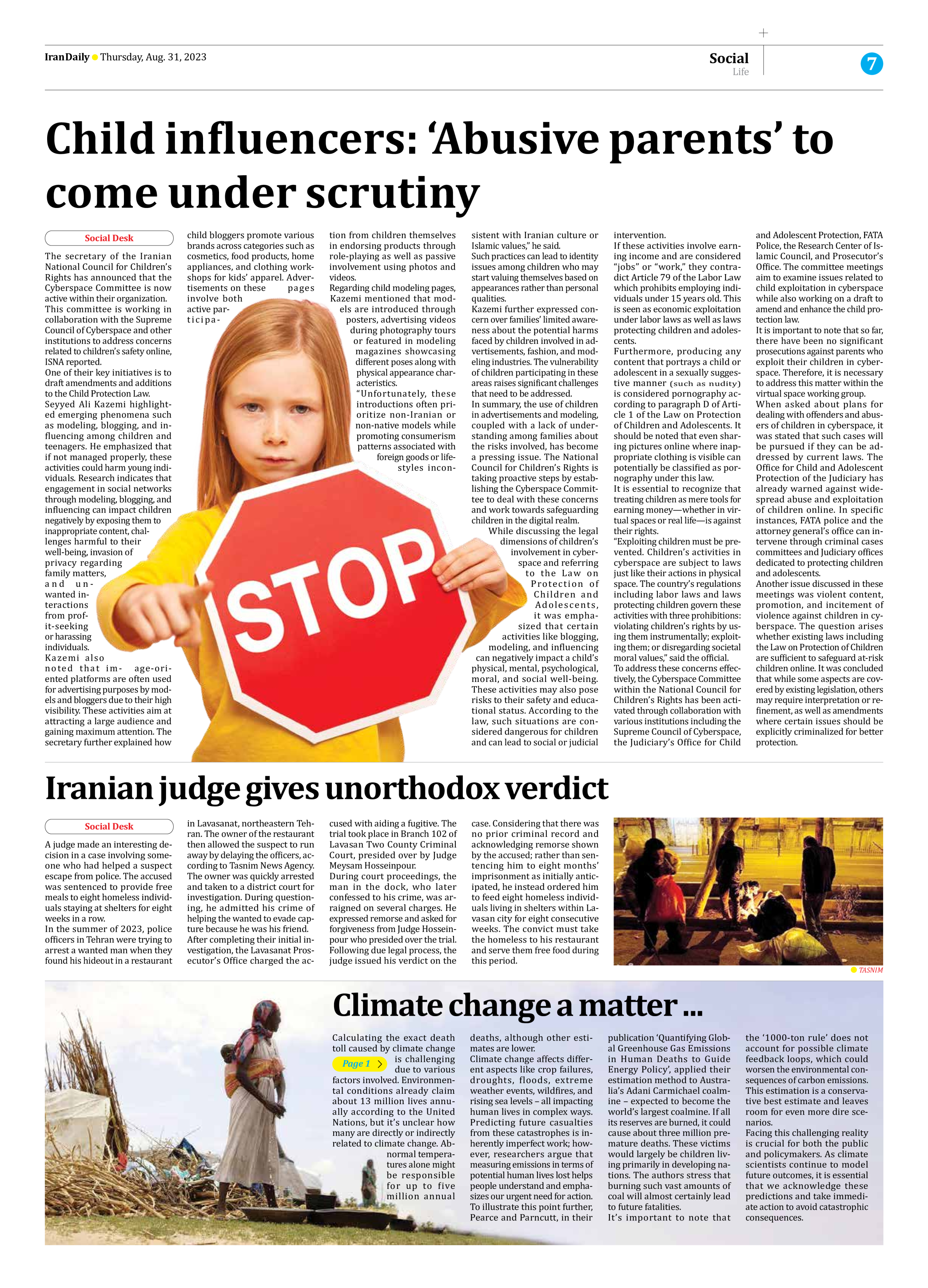
Child influencers: ‘Abusive parents’ to come under scrutiny
The secretary of the Iranian National Council for Children’s Rights has announced that the Cyberspace Committee is now active within their organization.
This committee is working in collaboration with the Supreme Council of Cyberspace and other institutions to address concerns related to children’s safety online, ISNA reported.
One of their key initiatives is to draft amendments and additions to the Child Protection Law.
Seyyed Ali Kazemi highlighted emerging phenomena such as modeling, blogging, and influencing among children and teenagers. He emphasized that if not managed properly, these activities could harm young individuals. Research indicates that engagement in social networks through modeling, blogging, and influencing can impact children negatively by exposing them to inappropriate content, challenges harmful to their well-being, invasion of privacy regarding family matters, and unwanted interactions from profit-seeking or harassing individuals.
Kazemi also noted that image-oriented platforms are often used for advertising purposes by models and bloggers due to their high visibility. These activities aim at attracting a large audience and gaining maximum attention. The secretary further explained how child bloggers promote various brands across categories such as cosmetics, food products, home appliances, and clothing workshops for kids’ apparel. Advertisements on these pages involve both active participation from children themselves in endorsing products through role-playing as well as passive involvement using photos and videos.
Regarding child modeling pages, Kazemi mentioned that models are introduced through posters, advertising videos during photography tours or featured in modeling magazines showcasing different poses along with physical appearance characteristics.
“Unfortunately, these introductions often prioritize non-Iranian or non-native models while promoting consumerism patterns associated with foreign goods or lifestyles inconsistent with Iranian culture or Islamic values,” he said.
Such practices can lead to identity issues among children who may start valuing themselves based on appearances rather than personal qualities.
Kazemi further expressed concern over families’ limited awareness about the potential harms faced by children involved in advertisements, fashion, and modeling industries. The vulnerability of children participating in these areas raises significant challenges that need to be addressed.
In summary, the use of children in advertisements and modeling, coupled with a lack of understanding among families about the risks involved, has become a pressing issue. The National Council for Children’s Rights is taking proactive steps by establishing the Cyberspace Committee to deal with these concerns and work towards safeguarding children in the digital realm.
While discussing the legal dimensions of children’s involvement in cyberspace and referring to the Law on Protection of Children and Adolescents, it was emphasized that certain activities like blogging, modeling, and influencing can negatively impact a child’s physical, mental, psychological, moral, and social well-being. These activities may also pose risks to their safety and educational status. According to the law, such situations are considered dangerous for children and can lead to social or judicial intervention.
If these activities involve earning income and are considered “jobs” or “work,” they contradict Article 79 of the Labor Law which prohibits employing individuals under 15 years old. This is seen as economic exploitation under labor laws as well as laws protecting children and adolescents.
Furthermore, producing any content that portrays a child or adolescent in a sexually suggestive manner (such as nudity) is considered pornography according to paragraph D of Article 1 of the Law on Protection of Children and Adolescents. It should be noted that even sharing pictures online where inappropriate clothing is visible can potentially be classified as pornography under this law.
It is essential to recognize that treating children as mere tools for earning money—whether in virtual spaces or real life—is against their rights.
“Exploiting children must be prevented. Children’s activities in cyberspace are subject to laws just like their actions in physical space. The country’s regulations including labor laws and laws protecting children govern these activities with three prohibitions: violating children’s rights by using them instrumentally; exploiting them; or disregarding societal moral values,” said the official.
To address these concerns effectively, the Cyberspace Committee within the National Council for Children’s Rights has been activated through collaboration with various institutions including the Supreme Council of Cyberspace, the Judiciary’s Office for Child and Adolescent Protection, FATA Police, the Research Center of Islamic Council, and Prosecutor’s Office. The committee meetings aim to examine issues related to child exploitation in cyberspace while also working on a draft to amend and enhance the child protection law.
It is important to note that so far, there have been no significant prosecutions against parents who exploit their children in cyberspace. Therefore, it is necessary to address this matter within the virtual space working group.
When asked about plans for dealing with offenders and abusers of children in cyberspace, it was stated that such cases will be pursued if they can be addressed by current laws. The Office for Child and Adolescent Protection of the Judiciary has already warned against widespread abuse and exploitation of children online. In specific instances, FATA police and the attorney general’s office can intervene through criminal cases committees and Judiciary offices dedicated to protecting children and adolescents.
Another issue discussed in these meetings was violent content, promotion, and incitement of violence against children in cyberspace. The question arises whether existing laws including the Law on Protection of Children are sufficient to safeguard at-risk children online. It was concluded that while some aspects are covered by existing legislation, others may require interpretation or refinement, as well as amendments where certain issues should be explicitly criminalized for better protection.







